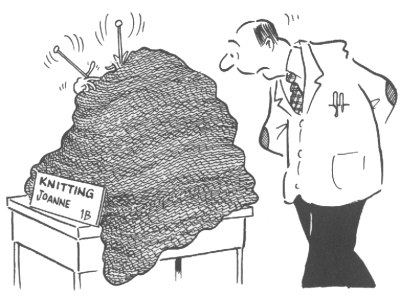How Much Television?
What Kind of Programmes?
Which Newspapers
|

|
The National Picture

How Much Television?
People do many different things in their spare time. Some play
games. Some watch sport. Others join choirs. Some enjoy
gardening. Most people read a newspaper or watch TV sometimes.
| a |
Draw a bar chart to show the
number of hours spent watching television last week by
pupils in your class. |
| b |
How many hours does the largest
group of pupils watch television? |
| c |
Is this what you expected? |
Table 6 shows the average number of hours spent each week
watching television in 1977.
| Age group |
February |
August |
| 5-14 |
22.0 |
19.0 |
| 15-19 |
17.6 |
15.0 |
Table 6 - Television viewing in the UK (average weekly hours),
1977 - (Source: Social Trends).
| d |
What was the average number of viewing hours for your
age group in February 1977? Mark this with an arrow on
the horizontal axis of your bar chart.
Mark also the August 1977 average viewing hours for your
age group. |
| e |
Why do you think the August figure is lower than the
February Figure? |
| f |
Why do you think the 15-19 age group watch less than
the 5-14 age group? |
| g |
Write two sentences comparing television viewing by
your class with the national picture. |
What Kind of Programmes?
You will need a copy of the Radio Times, TV Times or a
newspaper. Your teacher will tell you which channel to choose.
Find tonight's programmes from 4.00 to 10.00 pm. Fit each
programme into one, and only one, of these types:
- News and current affairs
- Comedy and variety
- Children's programmes
- Plays and films
- Regular series e.g. Panorama
- Sport
- Other programmes
| a |
Find out how many minutes each
programme is on.
Fill in Table 20 on page R3. |
From 4.00 to 10.00 pm is 360 minutes.
| b |
Show these 360 minutes of
television programmes on a pie chart (for example, 30
degrees will represent 30 minutes). |
| c |
Write two sentences about your
pie chart. |
| d |
Write two sentences comparing
your pie chart with that of someone who did another
channel. |
Find either BBC 1, BBC 2 or ITV programmes for the whole of
today and for Saturday. Your teacher will tell
you which channel to use.
| e |
Calculate how long each type of
programme is shown. Record your answers in Table 21 on
page R3. |
| f |
Draw two bar charts to show how
long each type of programme is on. One bar chart is for
today's programmes, the other bar chart is for Saturday's
programmes. |
| g |
Write down two differences
between your two bar charts. |
*Which Newspapers Do You Read?
| a |
Draw a pie chart to show the
different national daily papers taken by families in your
class. |
| b |
Draw a pie chart to show the
different Sunday newspapers taken. |
Table 7 shows the average number of copies of each issue of
different newspapers sold in 1977. The number of copies sold is
called the newspaper's 'circulation'.
| Daily paper |
Circulation |
| Daily Mirror |
38 |
| Sun |
37 |
| Daily Express |
24 |
| Daily Mail |
18 |
| Daily Telegraph |
13 |
| The Guardian |
3 |
| The Times |
3 |
| |
136 hundred thousand (13,600,000) |
| Sunday paper |
Circulation |
| News of the World |
49 |
| Sunday Mirror |
40 |
| Sunday People |
39 |
| Sunday Express |
33 |
| Sunday Times |
14 |
| Sunday Telegraph |
8 |
| The Observer |
7 |
| |
190 hundred thousand (19,000,000) |
Table 7 -Newspaper circulation in hundreds of thousands (1977)
- (Source: Britain 1978, An official handbook, HMSO).
| c |
Draw a pie chart to show the
daily papers sold in 1977. (360/136 = 2.6) |
| d |
Draw a pie chart to show the
Sunday newspapers sold in 1977. (360/190 = 1.9) |
| e |
Compare your pie charts from the
class data with the national picture. Are they similar?
What is different? Why do you think this is? |
|